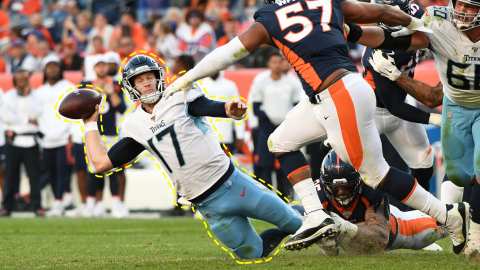Take the blame, all of it: Life lessons from the NFL blooper reel

Benjamin Franklin once wrote in a letter that “in this world nothing can be said to be certain, except death and taxes.” As much as we admire Franklin’s wit, he forgot about the third certainty: You will make mistakes.
When that happens, the factor that distinguishes a capable leader from an ineffectual one is how they manage the fallout. This is especially true in the modern work environment, where we rely on colleagues to perform their jobs well so that we may do so in turn.
How do we effectively stop the buck? Executive coach Alisa Cohn shares what she’s learned from running learning labs and ownership interventions.
As Cohn notes, businesses run on predictable outcomes. The most significant roadblock to achieving predictable outcomes might just be the failure to put any one person in charge of a project. Co-running a project or having everyone be responsible sounds nice in theory, but in practice it’s how things slip through the cracks.
For Cohn, assigning ownership and accountability isn’t about tying a red ribbon to the office scapegoat. Accountability is the beginning of an opportunity, one that allows us to develop a company culture that can measure progress, develop solutions, build trust, and celebrate collective success.
Think taking responsibility at the office is embarrassing? Try accepting the blame in front of millions of rabid football fans.
Super Bowl XLIX, end of the second half. The Seattle Seahawks are a mere yard from the Patriots’ end zone. Their quarterback, Russell Wilson, calls out the count. The snap. Wilson takes two steps back, his defensive line losing ground. He spies one of his wide receivers on the end line coming up the middle. Wilson fires, and the ball is caught—by Patriots defensive back Malcom Butler.
The game is over. The Seahawks have lost.
In the aftermath, fans, sports journalists, and armchair quarterbacks took shots at Wilson. They blamed him for losing the game. They denigrated his ego for ignoring better plays. And they, of course, boasted that they wouldn’t have made such a boneheaded move if they had been on the gridiron.

What did Wilson do in the face of such criticism? He took ownership of the play.
“One of the reasons why I always will and always do [take responsibility] is because I know that it’s gonna happen again for me,” Wilson told The Players’ Tribune. “I’m the one that threw the pass, but I know I’ll throw another one. And hopefully I’ll be remembered for something different.”
Sports may offer the thrill of victory, but its central focus on the scoreboard and very obvious and undeniable win-lose result also offers players the unique chance to admit defeat (which doesn’t often happen in business or in life) and take responsibility for mistakes. Take Steelers quarterback Ben Roethlisberger. He followed Wilson’s lead and took accountability for a devastating loss against the Patriots this season, saying “I wasn’t good enough.”
Let’s be fair to Wilson and Roethlisberger. Like business, football is a team sport. Over the course of a game, no single play or player shoulders complete responsibility for any defeat. There are many catches, fumbles, kicks, and tackles that, had they gone this way or that, may have changed the course of the game. We highlight these two players because: A) they specifically owned their plays, B) their gaffes were heavily scrutinized, yet C) they stood to answer for those gaffes. We find that admirable.
What is the impact of a leader taking the blame—all of it? How might that make their team feel? It’s a selfless act that models authenticity, builds respect, and perhaps prompts team members to think: What could I have done to stop my leader having to take all this blame? Accountability can be a unifying force that builds close bonds.
This philosophy was best summed up by Bill Belichick, coach of the Patriots. As he told his team during Super Bowl XLIX, “There’s no mystery here, fellas. It’s trusting each other, and everybody doing their job.”
Cohn couldn’t have put it better herself.
The discomfort associated with taking ownership originates with mindset. If we change our mindset, can we exorcise those negative emotions? Learn the methods of mindset mastery with video lessons ‘For You’ and ‘For Business’ from Big Think+. You can sign up for yourself right now, or request a demo for your organization.




